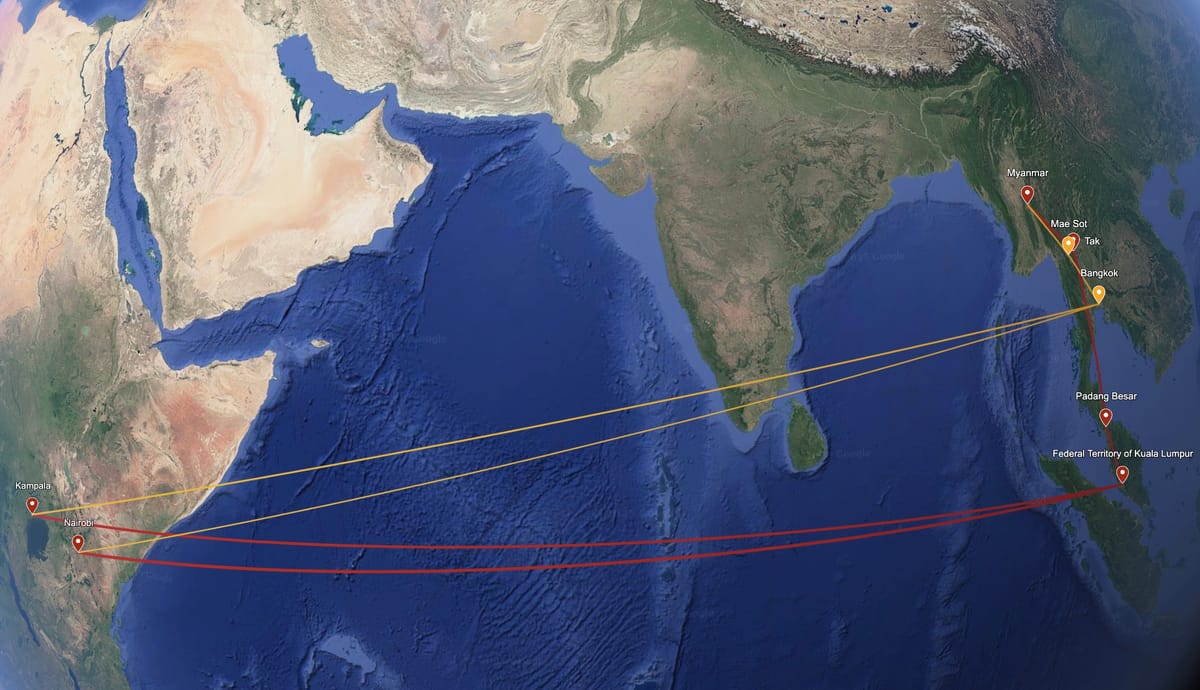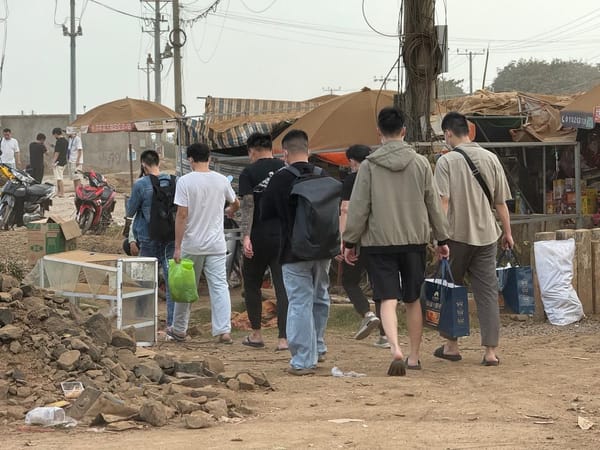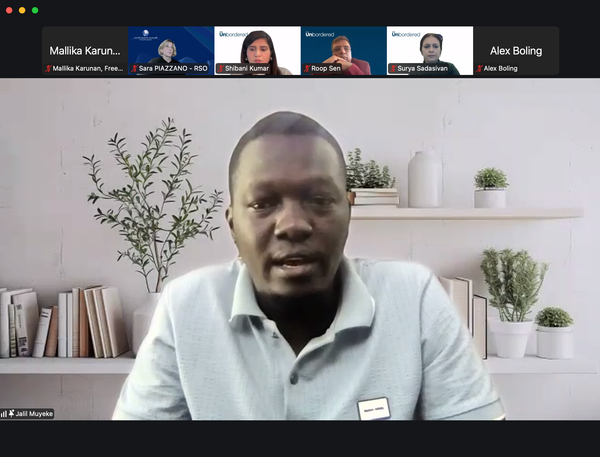CSOs highlight new trafficking routes from East Africa into Myanmar’s scam centers
Traffickers find new routes into Myanmar to evade travel restrictions and heightened security, an investigation finds the U.S. has aggressively rolled back its anti-trafficking efforts, and experts mark 20 years of the Council of Europe Anti-Trafficking Convention.

New travel restrictions imposed by the Kenyan Government on travel to Bangkok have prompted human traffickers to adapt their methods and seek alternative routes into Southeast Asia using Malaysia as a key transit point. The restrictions were introduced for nationals under the age of 35 traveling as lone holidaymakers, in an effort to prevent individuals from being trafficked into forced criminality or voluntarily seeking employment in cyber-scam operations across the region. According to Freedom Collaborative’s partner organizations working on the ground, the changes have led traffickers to adjust their approach, recruiting and transporting people through Malaysia before moving them overland into Myanmar via Thailand.
Previously, trafficking victims were most often flown into Bangkok before being smuggled across the Thai–Myanmar border at Mae Sot, but an increased security presence has made that route less accessible. There are now reports of individuals being flown into Kuala Lumpur – on the basis of fraudulent promises of legitimate work in Malaysia and assurances that this route is safe from scamming networks – where they are housed for several days in a hotel reportedly owned by the operator of the notorious KK Park scamming compound in Myanmar. From there, they are transported by land via a crossing near Padang Besar on the border of Malaysia and Thailand, bypassing Thai immigration altogether and leaving no official record of their presence in the country (unlike those traveling through Bangkok, who often hold an immigration entry stamp into Thailand but no record of exit). They are then moved north through Thailand before being smuggled into Myanmar via remote mountain crossings, and taken to work in one of the country’s rapidly expanding online scamming centers.
Several recent cases reported by frontline groups highlight this emerging trafficking corridor. In one incident, nine Kenyan nationals who had traveled through Malaysia were arrested in Songkhla Province, Thailand, en route to Myanmar, without visas or official immigration exit from Malaysia and entry into Thailand. They are currently being held in immigration detention and face possible prison sentences. Meanwhile, a group of Cameroonians traveling via Malaysia on fraudulent documents procured by their traffickers are also facing charges and possible criminal sentences.
Another case involved a Ugandan woman who traveled with a group from Kampala to Kuala Lumpur in June. After a week in the city, they continued to Padang Besar, where they crossed into Thailand by land and traveled north through Chumphon and Tak before being moved over mountain terrain into Myanmar. In September, a second Ugandan woman followed a similar route, this time from Rantau Panjang, Malaysia, into Sungai Kolok, Thailand – a journey which was reportedly facilitated by Filipino nationals. She described crossing the border by wading across the river, then waiting in an unknown house while her passport was taken and returned to her with a fake stamp, before continuing the journey north via Bangkok and Tak, and being smuggled across into Myanmar.
Despite intervention by NGOs, Thai authorities are not always convinced that such cases should be classified as trafficking, thereby denying access to victim identification processes via the National Referral Mechanism, or the right to legal counsel.
Organizations working along the Thai–Myanmar border, including Global Advance Projects and Acts of Mercy International, have expressed deep concern about this new pathway, saying they have identified at least 14 other individuals who are believed to have used or are planning to use this new route into Myanmar.
Partners warn that these developments demonstrate the rapid adaptability of trafficking networks in reaction to policy changes, underscoring the urgent need for cross-border cooperation to ensure timely and effective responses. They also express serious concern for victims, who face the risk of being arrested and treated as irregular migrants, without the opportunity to be identified as victims of trafficking or to access legal assistance, welfare, and other essential support services.
This issue will be discussed as part of our cross-regional cooperation activities, including the monthly capacity-building calls between our Trafficking for Forced Criminality Response Working Group and the East and Horn of Africa Anti-Trafficking (EHAAT) Network, which focus on the growing numbers of East Africans trafficked into scam compounds in Southeast Asia.
Here’s a roundup of other noteworthy news and initiatives:
A new investigative article shows the Trump administration has rolled back anti-trafficking efforts across multiple government departments, from redirecting Department of Homeland Security (DHS) agents to immigration enforcement to cutting grants and staff in the State and Justice Departments. The hollowing out of the State Department’s TIP office and the unprecedented delay of its annual report are particularly troubling, experts note, signaling impunity for traffickers and reduced protections for survivors.
This comes as the 25th anniversary of the Trafficking Victims Protection Act approaches, with ATEST urging Congress to reauthorize the law, maintain FY26 funding, integrate anti-trafficking into State Department programs, and press the administration to release the delayed 2025 TIP Report. Advocates warn that failure to act will further erode the infrastructure of the U.S. response and embolden traffickers.
At the same time, Polaris announced it will no longer operate the U.S. National Human Trafficking Hotline after running the service for 18 years, following a decision by the Department of Health and Human Services (HHS) to award the role to another organization. While highlighting its legacy of connecting hundreds of thousands of survivors to safety, services or information, Polaris has pledged to channel its expertise into strengthening systemic responses and survivor leadership beyond the hotline.
A high-level conference in Warsaw marked the 20th anniversary of the Council of Europe Anti-Trafficking Convention and the 30th anniversary of La Strada International last week, bringing together policymakers, experts, and civil society. Speakers highlighted new threats linked to the war in Ukraine and migration flows, rising cases of labour and child trafficking, and persistently low conviction rates, urging governments to reinvest in specialized anti-trafficking units and uphold their commitments under the Convention.
IOM has launched two new resources — a Handbook and Operational Guidelines for Businesses on Remediation of Migrant Worker Grievances — developed with The Remedy Project and informed by business and civil society consultations. Framing remedy as one of the most neglected areas in business and human rights, the tools provide both conceptual grounding and practical steps to help companies build credible, worker-centered grievance systems that address exploitation and root causes of harm.
Chinese customs data shows that exports from Xinjiang to the U.S. surged by 265 per cent to US$2.4 billion in the first seven months of 2025, despite U.S. trade restrictions tied to forced labour and human rights concerns. The spike, even as overall Chinese exports to the U.S. fell by a third under new tariffs, highlights serious questions about how effectively restrictions on Xinjiang-linked goods are being enforced.
A new report released by War Child UK, Save Ukraine, and the Human Security Centre details the systemic abduction, indoctrination and militarization of Ukrainian children under Russian occupation – including weapons training, propaganda lessons, and forced participation in paramilitary structures – and describes these actions as part of Russia’s state-driven strategy to erase Ukrainian identity and prepare children as future resources for its military ambitions. The findings are based on the testimonies of 200 recently returned Ukrainian children and young people.
The Inter-Agency Coordination Group against Trafficking in Persons (ICAT) is running a webinar series on the links between trafficking and organized crime. The final session on 25 September will focus on the way in which trafficking intersects with cyber and cyber-enabled crime, and how to address emerging digital threats.




